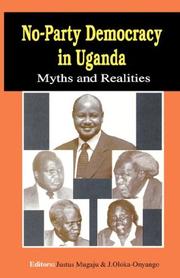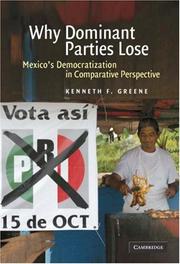| Listing 1 - 10 of 10 |
Sort by
|
Book
ISBN: 1626371172 9781626371170 9781588266309 1588266303 Year: 2022 Publisher: Boulder
Abstract | Keywords | Export | Availability | Bookmark
 Loading...
Loading...Choose an application
- Reference Manager
- EndNote
- RefWorks (Direct export to RefWorks)
Are political parties an essential element of democracy? Or can a no-party system constitute a viable democratic alternative? Giovanni Carbone examines the politics of Museveni’s Uganda to illustrate the achievements, contradictions, and limitations of participatory politics in the absence of partisan organizations. At a time when multiparty reforms were sweeping the globe, Uganda opted for a controversial, no-party democratic model. The country’s politics over the past two decades thus provide the perfect opportunity for addressing the many questions—theoretical, empirical, and comparative—that the notion of a no-party system of elected government raises. Carbone’s analysis of how a no-party electoral regime actually works (or doesn’t) in Uganda fills a gap in both democracy studies and the study of African politics.
Political parties --- One-party systems --- Democracy --- Single-party systems --- Parties, Political --- Party systems, Political --- Political party systems --- Political science --- Divided government --- Intra-party disagreements (Political parties) --- Political conventions --- Uganda --- Politics and government

ISBN: 9970022040 Year: 2000 Publisher: Kampala Fountain
Abstract | Keywords | Export | Availability | Bookmark
 Loading...
Loading...Choose an application
- Reference Manager
- EndNote
- RefWorks (Direct export to RefWorks)
Political parties --- One party systems --- Democracy --- Partis politiques --- Parti unique --- Démocratie --- National Resistance Movement (Uganda) --- Uganda --- Ouganda --- Politics and government --- Politique et gouvernement --- One-party systems --- Démocratie --- Parties, Political --- Party systems, Political --- Political party systems --- Political science --- Divided government --- Intra-party disagreements (Political parties) --- Political conventions --- Single-party systems --- NRM
Book
ISBN: 1003264972 1032207337 1000608468 Year: 2022 Publisher: London : Routledge,
Abstract | Keywords | Export | Availability | Bookmark
 Loading...
Loading...Choose an application
- Reference Manager
- EndNote
- RefWorks (Direct export to RefWorks)
"This book examines the political parties which emerged in the former Ottoman, Qing, Russian, and Habsburg empires and not only took over government power, but merged with government itself. It discusses how these parties, disillusioned with previous constitutional and parliamentary reforms, justified their takeovers with programs of controlled or supervised economic and social development, including acting as the mediators between the various social and ethnic groups in the respective territories. It pays special attention to nation-building through the party, to institutions (both constitutional and de facto), and to the global and comparative aspects of one-party regimes. It explores the origins of one-party regimes in China, Czechoslovakia, Korea, the Soviet Union, Turkey, Yugoslavia, and beyond, the roles of socialism and nationalism in the parties' approaches to development and state-building, as well the pedagogical aspirations of the ruling elites. Hence, by revisiting the dynamics of the transition from the earlier imperial formations via constitutionalism to one-party governments, and by assessing the internal and external dynamics of one-party regimes after their establishment, the book more precisely locates this type of regime within the contemporary world's political landscape. Moreover, it emphasises that one-party regimes thrived on both sides of the Cold War and in some of the non-aligned states, and that although some state socialist one-party regimes collapsed in 1989-1991, in other places historically dominant parties and new parties have continued to monopolize political power."
One-party systems. --- Nationalism. --- Consciousness, National --- Identity, National --- National consciousness --- National identity --- International relations --- Patriotism --- Political science --- Autonomy and independence movements --- Internationalism --- Political messianism --- Single-party systems --- Political parties --- Europe, Eastern --- Asia --- Politics and government --- Asian and Pacific Council countries --- Eastern Hemisphere --- Eurasia
Book
ISBN: 0465005691 Year: 1970 Publisher: New York (N.Y.): Basic Books
Abstract | Keywords | Export | Availability | Bookmark
 Loading...
Loading...Choose an application
- Reference Manager
- EndNote
- RefWorks (Direct export to RefWorks)
Political systems --- One party systems --- Totalitarianism --- Parti unique --- Totalitarisme --- 321.6 --- -Totalitarianism --- -#SBIB:324H43 --- #SBIB:324H40 --- Totalitarian state --- Authoritarianism --- Collectivism --- Despotism --- Dictatorship --- Fascism --- National socialism --- Single-party systems --- Political parties --- Niet-democratische staatsvormen. Antidemokratie. Dictatuur. Totalitarisme--(politieke stelsels) --- Addresses, essays, lectures --- Politieke structuren: politieke partijen --- Politieke structuren: algemeen --- 321.6 Niet-democratische staatsvormen. Antidemokratie. Dictatuur. Totalitarisme--(politieke stelsels) --- One-party systems --- #SBIB:324H43 --- One-party systems.

ISBN: 9780521877190 0521877199 9780511509803 9780521139892 9780511335532 0511335539 0511333676 9780511333675 0511334958 9780511334955 1107182883 1281040592 9786611040598 1139133101 0511334354 0511509804 0521139899 Year: 2007 Publisher: Cambridge Cambridge University Press
Abstract | Keywords | Export | Availability | Bookmark
 Loading...
Loading...Choose an application
- Reference Manager
- EndNote
- RefWorks (Direct export to RefWorks)
Why have dominant parties persisted in power for decades in countries spread across the globe? Why did most eventually lose? Why Dominant Parties Lose develops a theory of single-party dominance, its durability, and its breakdown into fully competitive democracy. Greene shows that dominant parties turn public resources into patronage goods to bias electoral competition in their favor and virtually win elections before election day without resorting to electoral fraud or bone-crushing repression. Opposition parties fail because their resource disadvantages force them to form as niche parties with appeals that are out of step with the average voter. When the political economy of dominance erodes, the partisan playing field becomes fairer and opposition parties can expand into catchall competitors that threaten the dominant party at the polls. Greene uses this argument to show why Mexico transformed from a dominant party authoritarian regime under PRI rule to a fully competitive democracy.
One-party systems. --- Opposition (Political science) --- Democratization --- Presidents --- Comparative government. --- Parti unique --- Opposition (Science politique) --- Démocratisation --- Présidents --- Institutions politiques comparées --- Election --- One-party systems --- Comparative government --- Démocratisation --- Présidents --- Institutions politiques comparées --- Comparative political systems --- Comparative politics --- Government, Comparative --- Political systems, Comparative --- Political science --- Presidency --- Heads of state --- Executive power --- Political opposition --- Divided government --- Single-party systems --- Political parties --- Social Sciences --- Political Science --- Democratization - Mexico --- Presidents - Mexico - Election - 2000
Book
ISBN: 9780593214787 0593214781 9780385545808 9780385545815 Year: 2020 Publisher: New York Random House Large Print
Abstract | Keywords | Export | Availability | Bookmark
 Loading...
Loading...Choose an application
- Reference Manager
- EndNote
- RefWorks (Direct export to RefWorks)
A Pulitzer Prize-winning historian and journalist examines the current world-wide rise of authoritarianism and explains how it appeals to citizens by using conspiracy theory, political polarization, social media and nostalgia.
Authoritarianism --- Democracy --- Nationalist parties --- One-party systems --- World politics --- Large type books --- #SBIB:324H20 --- #SBIB:324H30 --- #SBIB:17H3 --- #SBIB:321H30 --- Large print books --- Sight-saving books --- Books --- People with visual disabilities --- Single-party systems --- Political parties --- Self-government --- Political science --- Equality --- Representative government and representation --- Republics --- Authority --- Politologie: theorieën (democratie, comparatieve studieën….) --- Politieke cultuur --- Politieke wijsbegeerte --- Hedendaagse politieke en sociale theorieën (vanaf de 19de eeuw): algemeen (incl. utilitarisme, burgerschap) --- Books and reading --- Political systems
Book
ISBN: 0801496969 0801423678 9780801423673 Year: 1990 Publisher: Ithaca (N.Y.): Cornell university press
Abstract | Keywords | Export | Availability | Bookmark
 Loading...
Loading...Choose an application
- Reference Manager
- EndNote
- RefWorks (Direct export to RefWorks)
Political parties --- Opposition (Political science) --- Representative government and representation --- Comparative government --- One-party systems --- Partis politiques --- Opposition (Science politique) --- Gouvernement représentatif --- Institutions politiques comparées --- Parti unique --- One party systems --- 321.7 --- #SBIB:324H40 --- Democratie. Plurale samenleving. Pluralisme. Democratische pluraliteit--(moderne democratie politieke stelsels) --- Politieke structuren: algemeen --- 321.7 Democratie. Plurale samenleving. Pluralisme. Democratische pluraliteit--(moderne democratie politieke stelsels) --- Gouvernement représentatif --- Institutions politiques comparées --- Political opposition --- Political science --- Divided government --- Single-party systems --- Political parties - Congresses --- Opposition (Political science) - Congresses --- Representative government and representation - Congresses --- Comparative government - Congresses --- One party systems - Congresses

ISBN: 3170088033 Year: 1987 Publisher: Stuttgart Berlin Köln Kohlhammer
Abstract | Keywords | Export | Availability | Bookmark
 Loading...
Loading...Choose an application
- Reference Manager
- EndNote
- RefWorks (Direct export to RefWorks)
Nationaal-socialisme --- National socialism --- National-socialisme --- Nazism --- Nazisme --- 342 <09> --- Executive power --- -Equality before the law --- -Political parties --- -One party systems --- -National socialism --- 329.18 <43> --- 943.086 --- Authoritarianism --- Fascism --- Nazis --- Neo-Nazism --- Totalitarianism --- World War, 1939-1945 --- Single-party systems --- Political parties --- Parties, Political --- Party systems, Political --- Political party systems --- Political science --- Divided government --- Intra-party disagreements (Political parties) --- Political conventions --- Equal rights --- Civil rights --- Justice --- Equal rights amendments --- Emergency powers --- Power, Executive --- Presidents --- Implied powers (Constitutional law) --- Separation of powers --- Staatsrecht--(geschiedenis) --- History --- Law and legislation --- -History --- Causes --- Powers --- 342 <09> Staatsrecht--(geschiedenis) --- Equality before the law --- One-party systems --- Law and legislation&delete& --- Germany --- Third Reich, 1933-1945 --- Politics and government
Book
ISBN: 235596016X 6167571252 Year: 2018 Publisher: Bangkok : Institut de recherche sur l’Asie du Sud-Est contemporaine,
Abstract | Keywords | Export | Availability | Bookmark
 Loading...
Loading...Choose an application
- Reference Manager
- EndNote
- RefWorks (Direct export to RefWorks)
Are the issues of civil society, “good governance”, and the role of NGOs in Vietnam part of a discursive discourse that is linked to a growing development industry in which development studies and economics dominate? Kleinen questions these issues based upon longitudinal research in Vietnam since the early 1990s. In this study, an effort is made to explain the concrete interactions between authorities of the Vietnamese one-party state and its citizens by introducing an attitude of participants to conceal their real intentions with the intent to disguise their actions in order to obtain benefits for their own. Using the concept of mimicry the author tries to grasp what it means to live in a society where political and economic life is dominated by elite groups and were social change is coming from different directions. Two case studies are presented here: one in which local stakeholders of home stay tourism achieve their goals to develop an acceptable form of co-habitation with ethnic minorities without questioning the state. Another case study focuses upon the rapid urbanization of the periphery of Hanoi where land grabbing and private economic gains of outsiders are at loggerheads with local experiences and perceptions of state-village relationships. The question remains what it means for Vietnam's modernization and the prospects of a civil society.
Civil society --- One-party systems --- Vietnam --- Social change --- Economic policy --- Politics and government --- Change, Social --- Cultural change --- Cultural transformation --- Societal change --- Socio-cultural change --- Social history --- Social evolution --- Single-party systems --- Political parties --- Social contract --- Betʻŭnam --- Biet Nam --- Bietnam --- Biyetnan --- Chính phủ nước Cộng hòa xã hội chủ nghĩa Việt Nam --- Cộng hòa xã hội chủ nghĩa Việt Nam --- Fītnām --- Fīyatnām --- Fiyitnām --- I︠U︡zhnyĭ Vʹetnam --- National Republic of Vietnam --- Nước Cộng hòa xã hội chủ nghĩa Việt Nam --- Petʻŭnam --- Republica Socialista de Vietnam --- Rèpublica socialista du Viêt Nam --- République socialiste du Vietnam --- RSV --- RSVN --- S.R.V. --- Satsyi︠a︡listychnai︠a︡ Rėspublika V'etnam --- Socialist Republic of Viet Nam --- Socialist Republic of Vietnam --- Sosialistiese Republiek Viëtnam --- Sot︠s︡ialisticheska republika Vietnam --- Sot︠s︡ialisticheskai︠a︡ Respublika Vʹetnam --- SRV --- SRVN --- Vʹet-Nam --- Vʹetnam --- Viet-Nam --- Vijetnam --- Vītnām --- Vīyitnām --- Vjetnamio --- Vyetnam --- Vyetnam Sosialist Respublikası --- Wietnam --- Yüeh-nan --- Сацыялістычная Рэспубліка В'етнам --- Социалистическа република Виетнам --- Виетнам --- В'етнам --- فيتنام --- Vietnam (Democratic Republic) --- Vietnam (Republic) --- politics --- Civil Society --- development --- rights --- ngo --- media --- freedoms --- Press --- governance
Book
ISBN: 0472903306 0472055631 Year: 2023 Publisher: Ann Arbor, Michigan : University of Michigan Press,
Abstract | Keywords | Export | Availability | Bookmark
 Loading...
Loading...Choose an application
- Reference Manager
- EndNote
- RefWorks (Direct export to RefWorks)
Disruptions as Opportunities: Governing Chinese Society with Interactive Authoritarianism addresses the long-standing puzzle of why China outlived other one-party authoritarian regimes with particular attention to how the state manages an emerging civil society. Drawing upon over 1,200 survey responses conducted in 126 villages in the Sichuan province, as well as 70 interviews conducted with Civil Society Organization (CSO) leaders and government officials, participant observation, and online research, the book proposes a new theory of interactive authoritarianism to explain how an adaptive authoritarian state manages nascent civil society. Sun argues that when new phenomena and forces are introduced into Chinese society, the Chinese state adopts a three-stage interactive approach toward societal actors: toleration, differentiation, and legalization without institutionalization. Sun looks to three disruptions--earthquakes, internet censorship, and social-media-based guerilla resistance to the ride-sharing industry--to test his theory about the three-stage interactive authoritarian approach and argues that the Chinese government evolves and consolidates its power in moments of crisis.
Authoritarianism --- One-party systems --- China --- Politics and government --- Single-party systems --- Political parties --- Political science --- Authority --- Cina --- Kinë --- Cathay --- Chinese National Government --- Chung-kuo kuo min cheng fu --- Republic of China (1912-1949) --- Kuo min cheng fu (China : 1912-1949) --- Chung-hua min kuo (1912-1949) --- Kina (China) --- National Government (1912-1949) --- China (Republic : 1912-1949) --- People's Republic of China --- Chinese People's Republic --- Chung-hua jen min kung ho kuo --- Central People's Government of Communist China --- Chung yang jen min cheng fu --- Chung-hua chung yang jen min kung ho kuo --- Central Government of the People's Republic of China --- Zhonghua Renmin Gongheguo --- Zhong hua ren min gong he guo --- Kitaĭskai︠a︡ Narodnai︠a︡ Respublika --- Činská lidová republika --- RRT --- Republik Rakjat Tiongkok --- KNR --- Kytaĭsʹka Narodna Respublika --- Jumhūriyat al-Ṣīn al-Shaʻbīyah --- RRC --- Kitaĭ --- Kínai Népköztársaság --- Chūka Jinmin Kyōwakoku --- Erets Sin --- Sin --- Sāthāranarat Prachāchon Čhīn --- P.R. China --- PR China --- PRC --- P.R.C. --- Chung-kuo --- Zhongguo --- Zhonghuaminguo (1912-1949) --- Zhong guo --- Chine --- République Populaire de Chine --- República Popular China --- Catay --- VR China --- VRChina --- 中國 --- 中国 --- 中华人民共和国 --- Jhongguó --- Bu̇gu̇de Nayiramdaxu Dundadu Arad Ulus --- Bu̇gu̇de Nayiramdaqu Dumdadu Arad Ulus --- Bu̇gd Naĭramdakh Dundad Ard Uls --- BNKhAU --- БНХАУ --- Khi︠a︡tad --- Kitad --- Dumdadu Ulus --- Dumdad Uls --- Думдад Улс --- Kitajska --- China (Republic : 1949- ) --- institutional disruptions --- social capital --- disaster politics --- differentiation --- non-profit politics --- East Asia --- contentious politics --- self media --- natural experiment --- Chinese Communist Party --- experiment --- social science methodology --- social media --- guerrilla resistance --- CSO --- public goods provision --- authoritarian resilience --- collective action --- civil society --- toleration --- earthquake --- protest --- legalization without institutionalization --- CCP --- democratization --- interactive authoritarianism --- state-society --- NGO --- CPC --- deliberate differentiation --- censorship
| Listing 1 - 10 of 10 |
Sort by
|

 Search
Search Feedback
Feedback About UniCat
About UniCat  Help
Help News
News